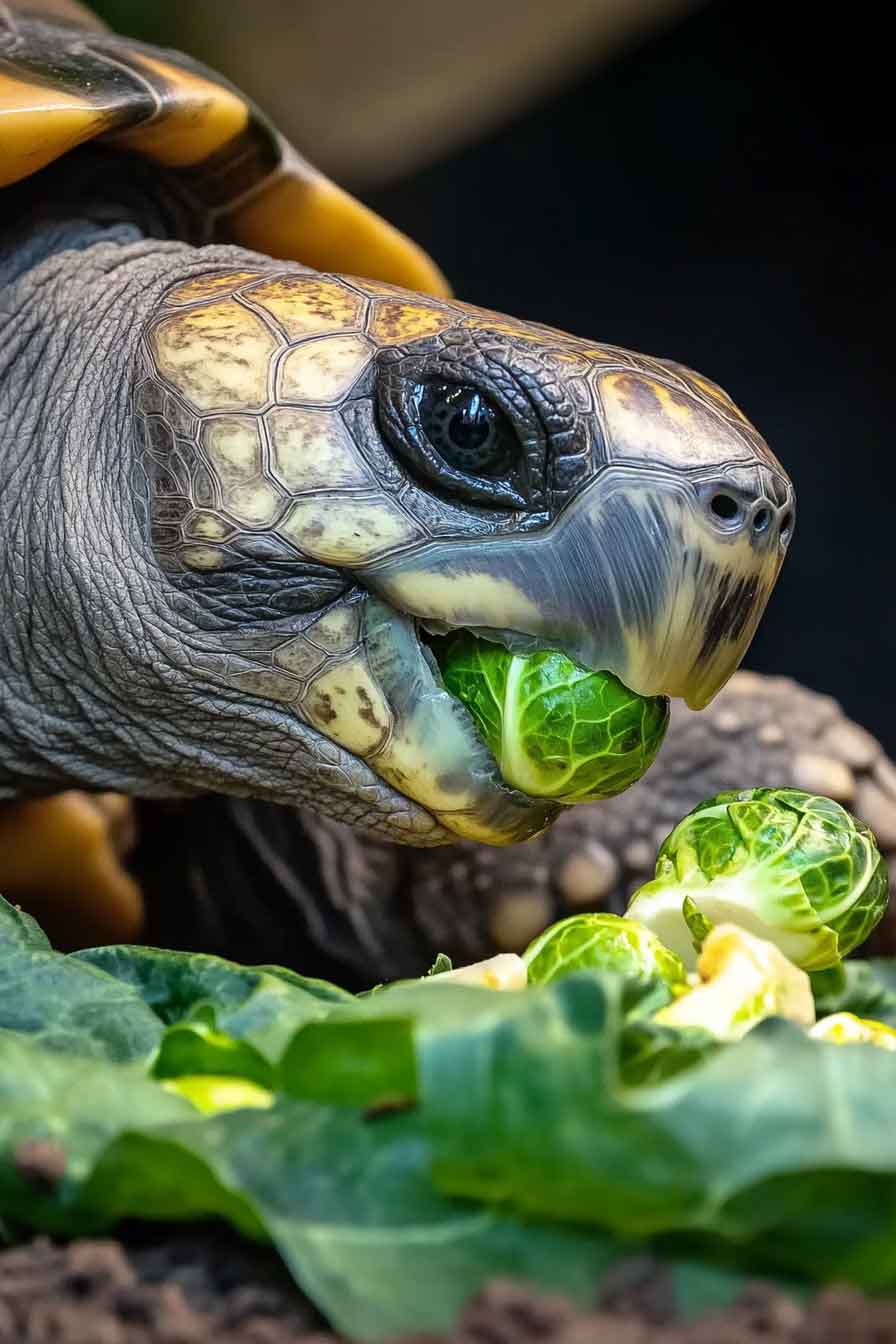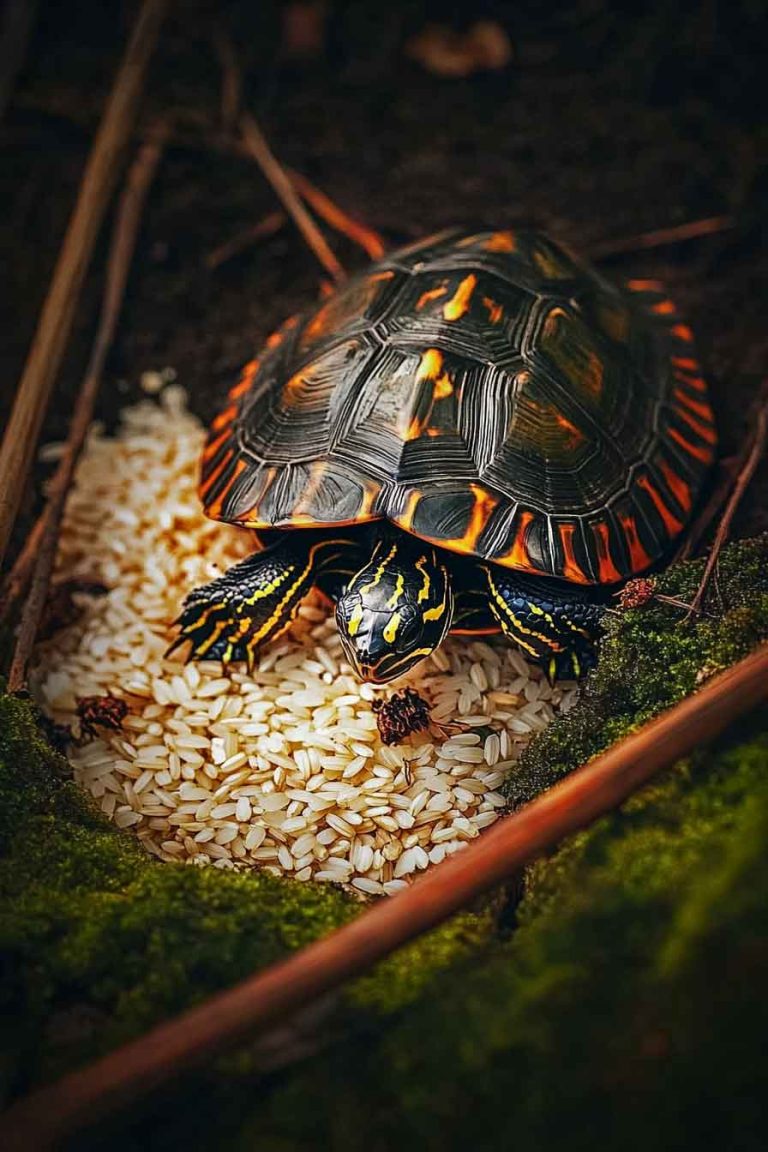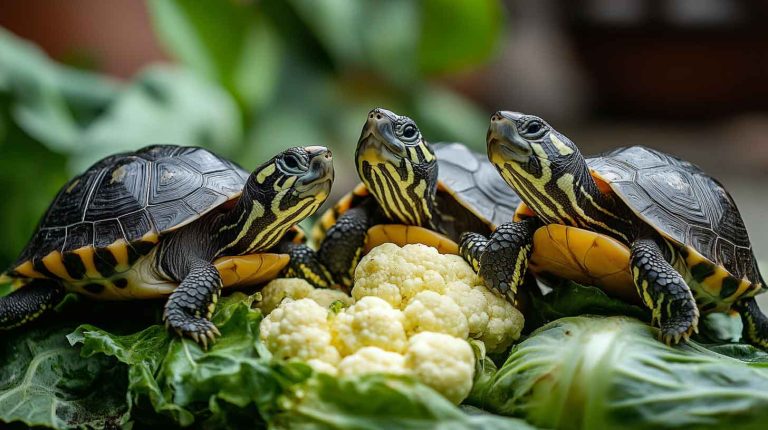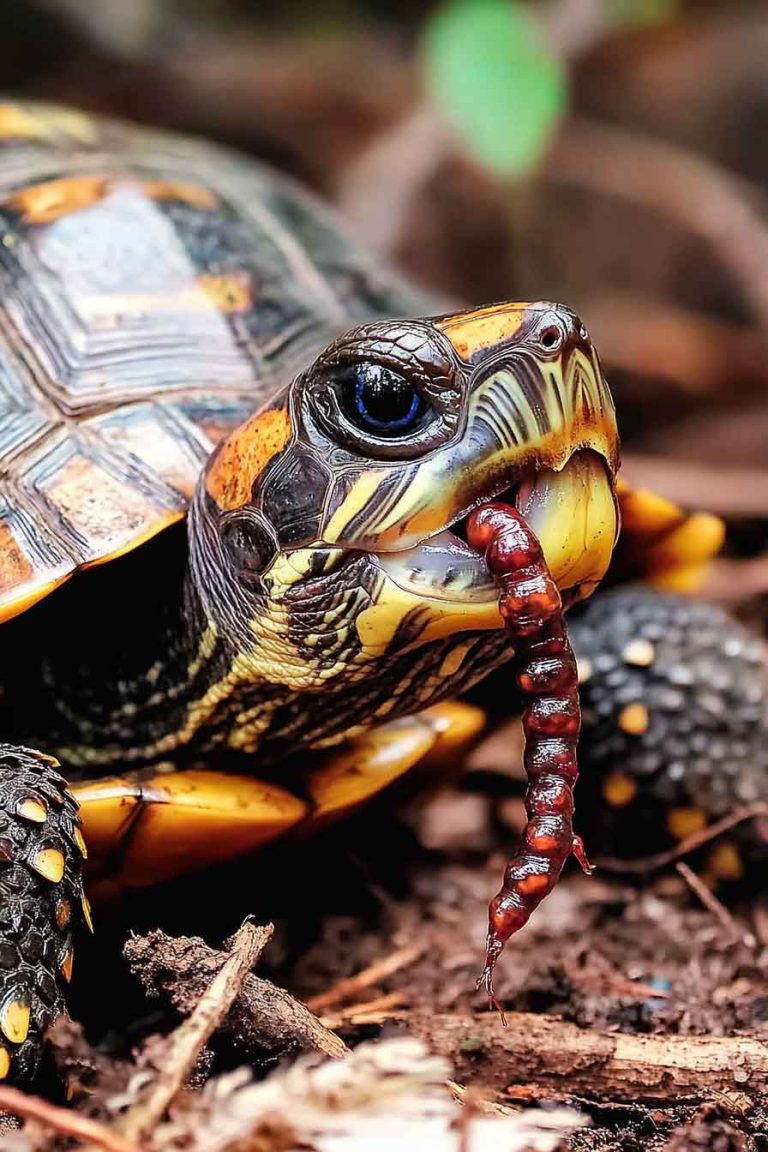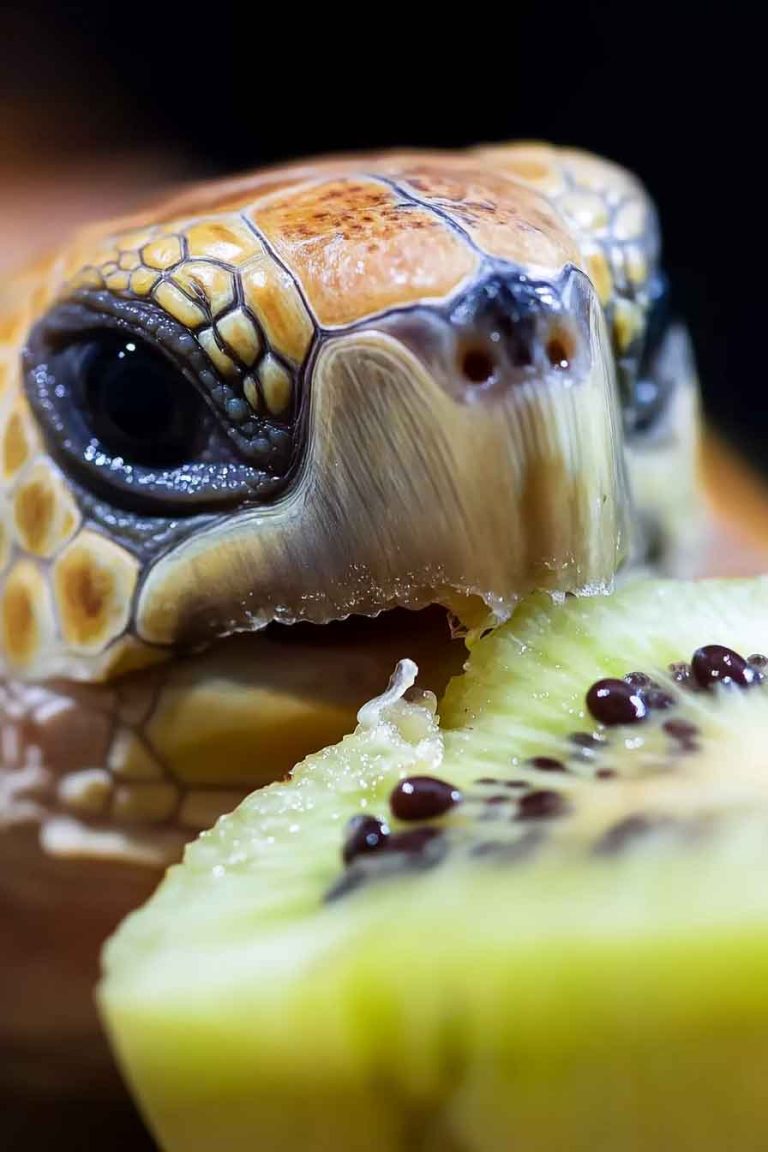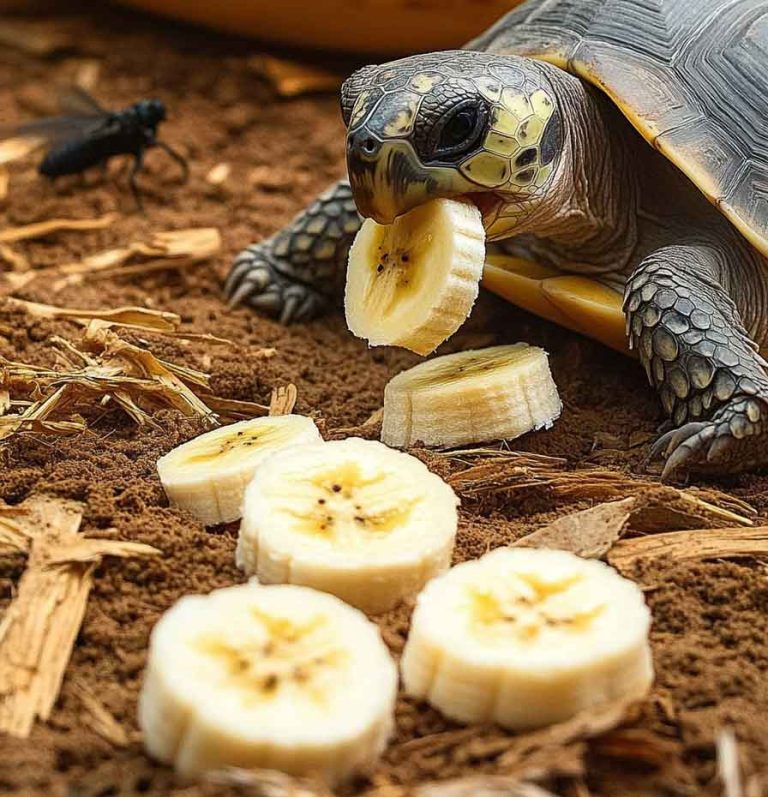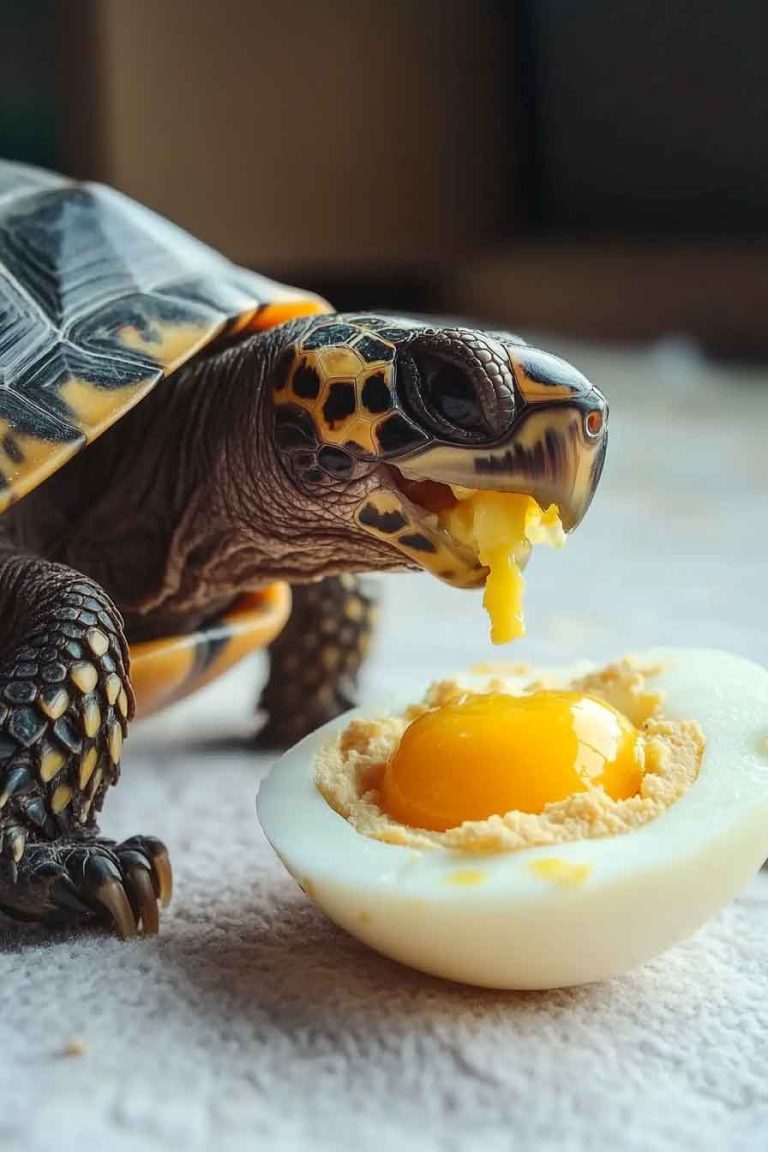Can Turtles Eat Brussels Sprouts? Benefits, Risks & Feeding Guide
If you’re a turtle owner like me, you’ve probably found yourself wondering whether you can share certain foods with your shelled companion. I’ve been there too – standing in my kitchen, looking at fresh Brussels sprouts, and wondering if my turtle would enjoy these little green vegetables. Today, I want to share everything I’ve learned…
If you’re a turtle owner like me, you’ve probably found yourself wondering whether you can share certain foods with your shelled companion. I’ve been there too – standing in my kitchen, looking at fresh Brussels sprouts, and wondering if my turtle would enjoy these little green vegetables. Today, I want to share everything I’ve learned about feeding Brussels sprouts to turtles.
So, can turtles eat Brussels sprouts? Yes, turtles can eat Brussels sprouts in moderation. These nutritious vegetables are safe for most turtle species and can provide valuable nutrients when prepared properly. However, like any food, Brussels sprouts should be given as part of a balanced diet and not as a primary food source.
In this comprehensive guide, I’ll walk you through everything you need to know about feeding Brussels sprouts to your turtle, including the benefits, risks, and proper preparation methods. Let’s dive in!
Can You Feed Brussels Sprouts To Your Pet Turtle?
The answer is yes – you can safely feed Brussels sprouts to your pet turtle. Unlike some vegetables that can be harmful to turtles, Brussels sprouts are generally considered safe and nutritious for most turtle species. However, I always recommend introducing any new food gradually to see how your turtle responds.
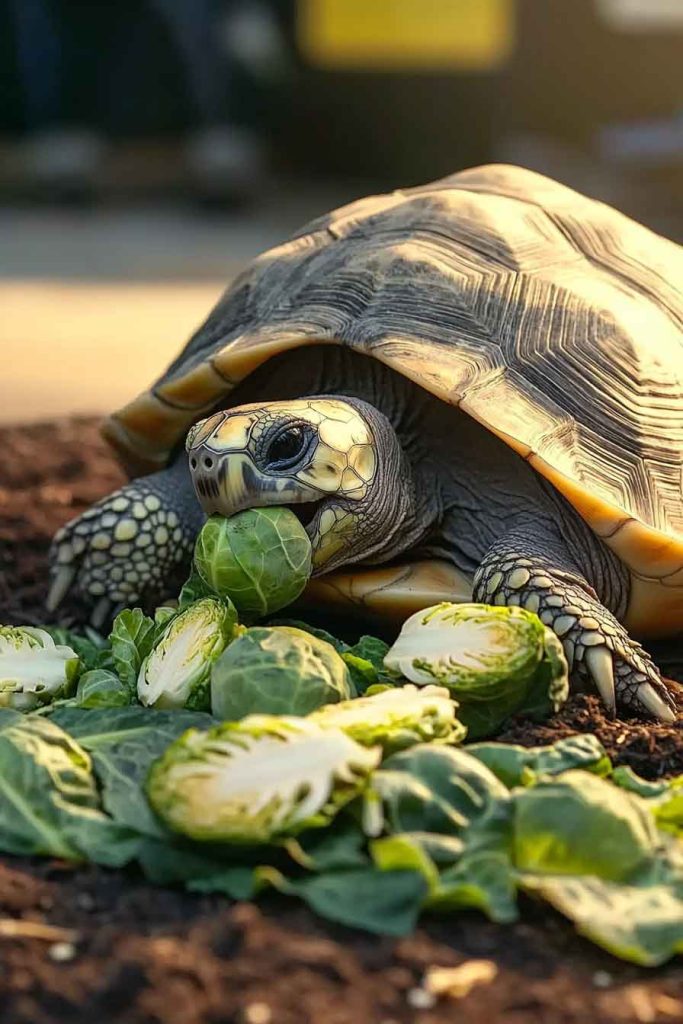
Brussels sprouts belong to the cruciferous vegetable family, which also includes cabbage, broccoli, and kale. These vegetables are packed with nutrients that can benefit your turtle’s health when given in appropriate amounts.
Let me break down the nutritional content of Brussels sprouts (per 100 grams) so you can understand what you’re offering your turtle:
Nutritional Content of Brussels Sprouts:
- Carbohydrates: 8.95 g
- Sugar: 2.2 g
- Protein: 3.38 g
- Calcium: 42 mg
- Phosphorus: 69 mg
- Vitamin C: 85 mg
- Vitamin K: 177 mcg
- Folate: 61 mcg
- Potassium: 389 mg
- Magnesium: 23 mg
- Iron: 1.4 mg
- Fiber: 3.8 g
Looking at this nutritional profile, I can see several positive aspects for turtle health. The calcium content is beneficial for shell development, though the calcium-to-phosphorus ratio isn’t ideal (it’s roughly 1:1.6). The high vitamin C content supports immune function, while the fiber aids in digestion.
Health Benefits of Brussels Sprouts for Turtles
From my research and experience, Brussels sprouts offer several health benefits for turtles when fed appropriately:
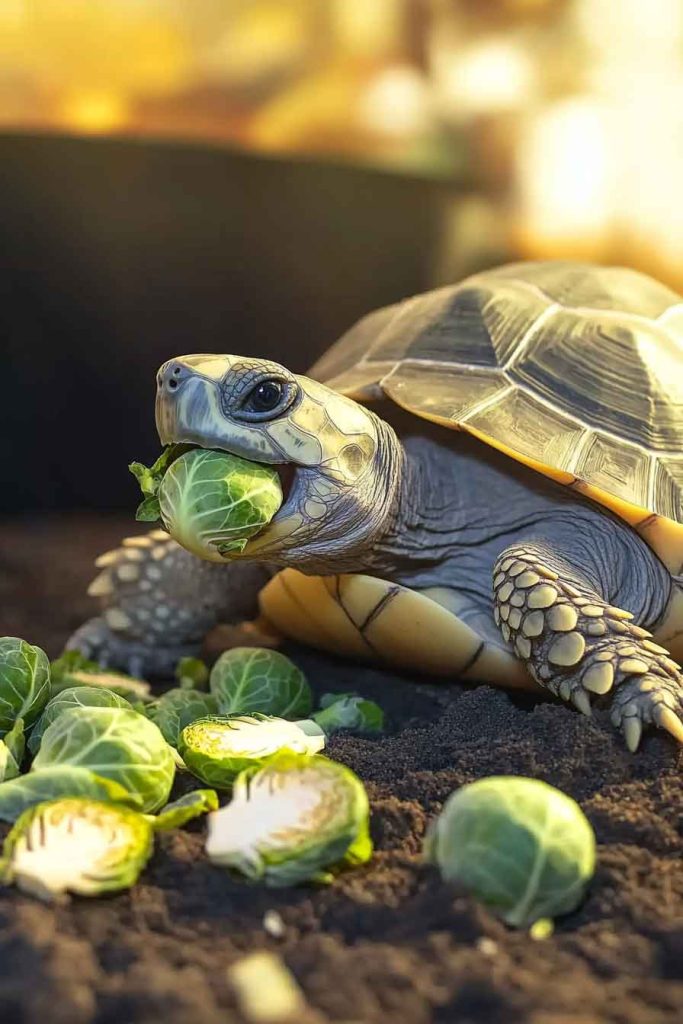
Immune System Support
Brussels sprouts are incredibly rich in vitamin C – containing about 85mg per 100 grams. This is particularly beneficial for turtles, as vitamin C helps strengthen their immune system and aids in fighting off infections. I’ve noticed that turtles who receive a varied diet including vitamin C-rich vegetables tend to be more active and healthier overall.
Shell and Bone Health
The calcium content in Brussels sprouts (42mg per 100g) contributes to maintaining strong shells and bones. While this isn’t the highest calcium content among vegetables, every bit helps in supporting your turtle’s skeletal health. I always look for ways to boost calcium in my turtle’s diet, and Brussels sprouts can be part of that strategy.
Digestive Health
The fiber content in Brussels sprouts (3.8g per 100g) helps promote healthy digestion in turtles. Fiber aids in proper bowel movements and can help prevent digestive issues. However, too much fiber can also cause problems, which is why moderation is key.
Antioxidant Properties
Brussels sprouts contain various antioxidants that help protect cells from damage. These compounds can contribute to your turtle’s overall health and longevity. The dark green color of Brussels sprouts indicates the presence of beneficial phytonutrients.
Do Turtles Like Brussels Sprouts?
In my experience, turtle preferences vary significantly from individual to individual. Some turtles I’ve worked with absolutely love Brussels sprouts, while others show little interest. The taste of Brussels sprouts can be quite strong and slightly bitter, which some turtles find appealing while others may reject.
I’ve found that the way you prepare Brussels sprouts can influence whether your turtle will eat them. Raw Brussels sprouts might be too tough and bitter for some turtles, while lightly blanched ones are often more palatable.
Potential Health Risks and Considerations
While Brussels sprouts are generally safe for turtles, there are some considerations I want you to be aware of:
Goitrogens
Brussels sprouts contain compounds called goitrogens, which can interfere with thyroid function if consumed in very large quantities. This is why I never recommend feeding Brussels sprouts as a daily staple. Occasional feeding poses no risk, but excessive consumption could potentially cause thyroid issues.
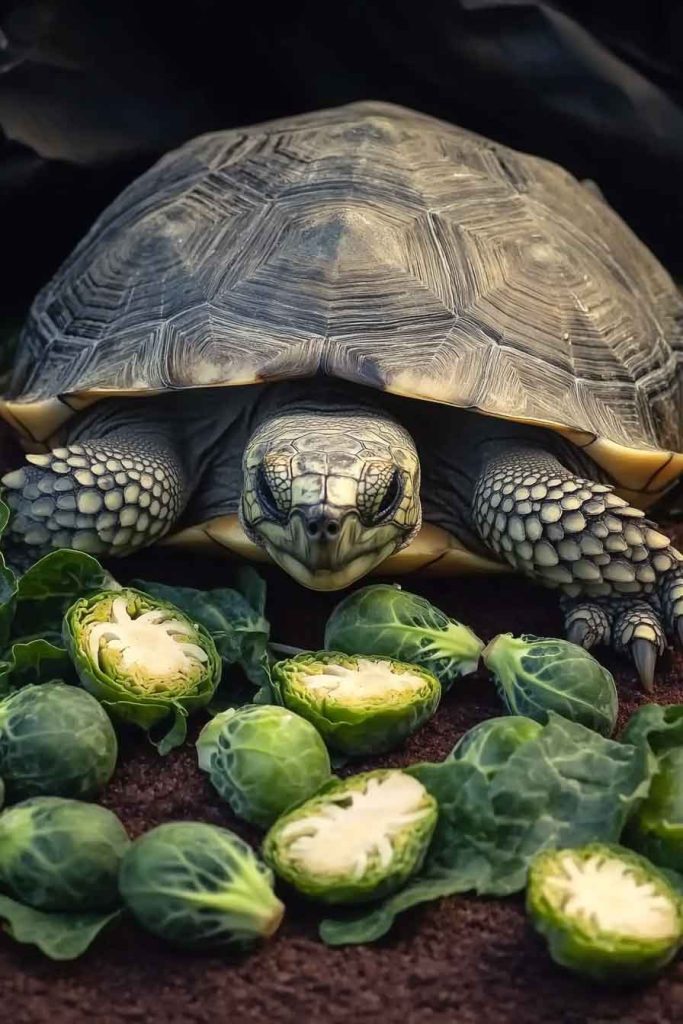
Calcium-Phosphorus Ratio
The calcium-to-phosphorus ratio in Brussels sprouts isn’t ideal for turtles. Turtles need a 2:1 calcium-to-phosphorus ratio in their overall diet. Brussels sprouts have more phosphorus than calcium, so I always balance this by offering high-calcium foods alongside them or dusting them with calcium powder.
Gas and Digestive Upset
Brussels sprouts can cause gas in both humans and turtles due to their high fiber content and certain sugars. If you notice your turtle becoming lethargic or showing signs of discomfort after eating Brussels sprouts, you might want to reduce the portion size or frequency.
Oxalates
Brussels sprouts contain moderate levels of oxalates, which can bind to calcium and potentially contribute to kidney stone formation if consumed excessively. This is another reason why moderation is important.
How to Properly Prepare Brussels Sprouts for Turtles
Proper preparation is crucial when feeding Brussels sprouts to your turtle. Here’s how I prepare them:
Step 1: Choose Fresh Brussels Sprouts
I always select firm, bright green Brussels sprouts without yellowing leaves or black spots. Fresh vegetables provide the best nutritional value and are safer for your turtle.
Step 2: Wash Thoroughly
Rinse the Brussels sprouts under cold running water to remove any dirt, pesticides, or bacteria. I sometimes soak them for a few minutes if they seem particularly dirty.
Step 3: Remove Outer Leaves
Peel away any damaged or yellowing outer leaves. These can harbor bacteria and don’t provide good nutrition.
Step 4: Choose Your Preparation Method
Raw: Cut into small, bite-sized pieces. This preserves the most nutrients but may be harder for your turtle to digest.
Blanched: Briefly boil for 2-3 minutes, then cool in ice water. This softens the vegetable while retaining most nutrients.
Steamed: Steam for 3-4 minutes until slightly tender. This method preserves nutrients well while making the sprouts easier to digest.
Step 5: Cool and Serve
Always allow cooked Brussels sprouts to cool to room temperature before offering them to your turtle. Hot food can burn your turtle’s mouth and throat.
How Much Brussels Sprouts Should Turtles Eat?
This is one of the most important questions I get asked. The key word here is moderation. Brussels sprouts should make up no more than 10-15% of your turtle’s vegetable intake, and vegetables should generally comprise 80-90% of an adult turtle’s diet (with the remainder being protein).
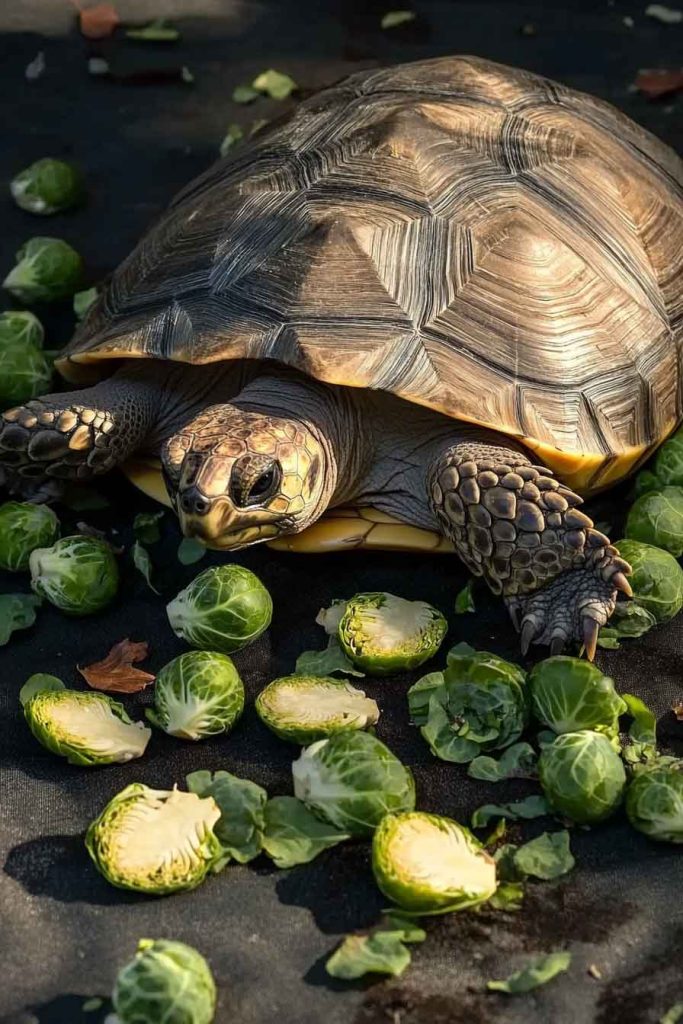
Here’s what I recommend:
For Adult Turtles: Offer Brussels sprouts 1-2 times per week, with portions roughly the size of your turtle’s head.
For Juvenile Turtles: Smaller portions, maybe once a week, as younger turtles need more protein in their diet.
For Baby Turtles: I generally avoid giving Brussels sprouts to very young turtles (under 6 months) as their digestive systems are still developing.
Can You Feed Brussels Sprouts to Different Turtle Species?
Let me address some specific turtle species and their relationship with Brussels sprouts:
Can Box Turtles Eat Brussels Sprouts?
Yes, box turtles can eat Brussels sprouts. As omnivores, box turtles have a varied diet that can include many vegetables. I’ve successfully fed Brussels sprouts to box turtles, and they seem to tolerate them well when given in moderation.
Can Red Eared Slider Turtles Eat Brussels Sprouts?
Red eared sliders can definitely eat Brussels sprouts. These semi-aquatic turtles are primarily herbivorous as adults and can benefit from the nutrients in Brussels sprouts. I recommend chopping them finely and offering them alongside other vegetables.
Can Painted Turtles Eat Brussels Sprouts?
Painted turtles, being omnivores that lean more herbivorous as they age, can eat Brussels sprouts. I’ve found that painted turtles often prefer their vegetables slightly softened, so light blanching works well.
Can Russian Tortoises Eat Brussels Sprouts?
Russian tortoises can eat Brussels sprouts, but I’m more cautious with this species. They’re adapted to a diet of grasses and weeds in their natural habitat, so cruciferous vegetables like Brussels sprouts should be offered sparingly – maybe once every two weeks.
Can You Feed Brussels Sprouts to Baby Turtles?
I generally don’t recommend feeding Brussels sprouts to baby turtles under 4-6 months old. Here’s why:
Baby turtles have different nutritional needs than adults. They require a diet much higher in protein (about 50% protein compared to 10-20% for adults). Their digestive systems are also more sensitive and less developed.
If you want to introduce Brussels sprouts to a juvenile turtle (6 months to 2 years), start with very small amounts – perhaps a piece the size of their eye – and only after they’ve established a good eating routine with their regular foods.
Alternative Vegetables for Turtles
While Brussels sprouts are nutritious, variety is key to a healthy turtle diet. Here are some other excellent vegetable options I regularly feed to turtles:
Leafy Greens: Collard greens, dandelion greens, mustard greens, turnip greens Squashes: Butternut squash, acorn squash, yellow squash Other Vegetables: Bell peppers, carrots, green beans, zucchini
I try to rotate vegetables regularly to ensure my turtles get a wide range of nutrients.
Signs Your Turtle Enjoys Brussels Sprouts
Over the years, I’ve learned to recognize when turtles enjoy their food:
- They approach the food quickly
- They eat eagerly without spitting out pieces
- They show interest when they see you preparing Brussels sprouts
- They continue to eat them consistently over multiple offerings
- They don’t show any signs of digestive upset afterward
Warning Signs to Watch For
On the flip side, here are warning signs that Brussels sprouts might not be agreeing with your turtle:
- Refusing to eat them consistently
- Spitting out pieces after tasting
- Lethargy after eating
- Changes in bowel movements
- Loss of appetite for other foods
If you notice any of these signs, I recommend discontinuing Brussels sprouts and consulting with a veterinarian if symptoms persist.
Frequently Asked Questions (FAQs)
How often can I feed Brussels sprouts to my turtle?
I recommend offering Brussels sprouts no more than 1-2 times per week as part of a varied diet. They shouldn’t be a daily food item.
Should I cook Brussels sprouts before feeding them to my turtle?
While not necessary, light cooking (blanching or steaming) can make Brussels sprouts easier to digest and more palatable for many turtles. Always cool them to room temperature before serving.
Can Brussels sprouts replace other vegetables in my turtle’s diet?
No, Brussels sprouts should complement, not replace, other vegetables. Variety is crucial for proper nutrition.
Are frozen Brussels sprouts okay for turtles?
Fresh is always best, but thawed frozen Brussels sprouts can be used occasionally. Avoid Brussels sprouts with added seasonings or sauces.
What if my turtle won’t eat Brussels sprouts?
Don’t force it! Some turtles simply don’t like certain foods. There are plenty of other nutritious vegetables to offer instead.
Can I mix Brussels sprouts with other vegetables?
Absolutely! I often create vegetable medleys that include Brussels sprouts along with other turtle-safe vegetables. This can make them more appealing and ensures better nutritional balance.
Conclusion
Brussels sprouts can be a healthy and nutritious addition to your turtle’s diet when offered appropriately. They provide valuable vitamins, minerals, and antioxidants that support your turtle’s health. However, like any food, they should be part of a balanced, varied diet rather than a staple.
Remember the key points I’ve shared: moderation is crucial, proper preparation matters, and always watch your turtle for any adverse reactions when introducing new foods. Every turtle is an individual with their own preferences and tolerances.
I hope this comprehensive guide has answered all your questions about feeding Brussels sprouts to your turtle. As always, when in doubt, consult with a veterinarian who has experience with reptiles. Your turtle’s health and happiness should always be the top priority.
Have you tried feeding Brussels sprouts to your turtle? I’d love to hear about your experiences in the comments below!

